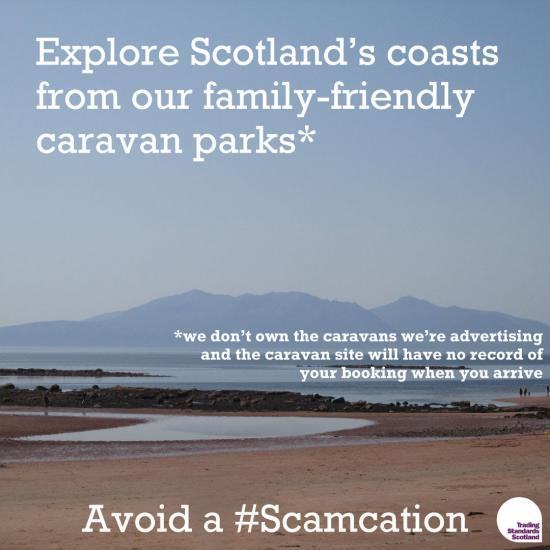Trading Standards - Scams - Caravans
15th August 2024

A recent study by Lloyds Bank found that 49% of holiday scams begin on Facebook or Facebook Marketplace. There has been a 7% rise in holiday purchase scams since 2023.
One woman posted a message to a community group on Facebook, saying that she was looking to stay in a caravan in Wales. She then received a message from someone who claimed they owned a caravan on a site in New Quay, Ceredigion.
The scammer sent pictures of the caravan as well as a blurred image of a certificate of ownership and said it was available on the dates the woman was looking for. She paid a deposit of £75, but then felt suspicious about some of the messages. She visited the website of the company who own the caravan site and found that the registered owner of the caravan she thought she had booked was not the person she had been messaging.
She later discovered that her details had been used to set up a shopping account with Next.
Another family saw a caravan holiday in Porthcawl, Wales, advertised on Facebook and paid a deposit of £240. When they arrived at the holiday park, they were told that the caravan they had booked didn't exist. They were unable to get in touch with the scammers, who had deleted their account.
How to Avoid
Do plenty of research before booking a holiday online. Before booking a holiday you have seen on social media or in an unsolicited email, contact the company via their official website or publicly listed phone number to check that it is legitimately available at the price quoted and for the required dates. Where possible, book directly with the provider or through a reputable agent.
If you are unfamiliar with a company, check that they are a member of a recognised trade association such as ABTA or that they have been recognised by a national tourism organisation such as Visit Scotland.
Avoid clicking on links in social media adverts as they could lead to copycat websites that look similar to genuine booking websites, with similar URLs.
Where possible, pay using a credit card rather than via bank transfer - this will offer you more protection if something goes wrong. Be suspicious if a provider will only give you the option to pay by cash or bank transfer.
Before making any payments, check the terms and conditions of the booking and the cancellation policy. Make sure you have contact details for the company or provider.
Scammers may also post fake accommodation listings to sites such as Airbnb and often ask for payment via bank transfer or outside the site's payment system. Be wary if a listing asks you to contact the host outside the website's mail system.
Find Out More
Original article: https://www.bbc.co.uk/news/articles/c4ge9043022o
TSS website: www.tsscot.co.uk/holiday-scams
ABTA Advice: www.abta.com/tips-and-advice/planning-and-booking-a-holiday/how-avoid-travel-related-fraud
Advice Direct Scotland: information about your consumer rights in relation to travel: consumeradvice.scot/knowledge-centre/#travel-and-transport
Lloyds Bank press release: www.lloydsbankinggroup.com/media/press-releases/2024/lloyds-bank-warns-holidaymakers-on-scams
